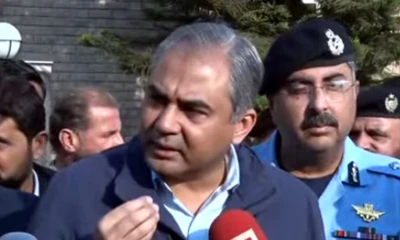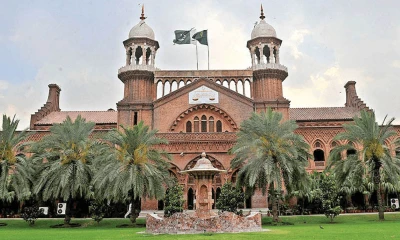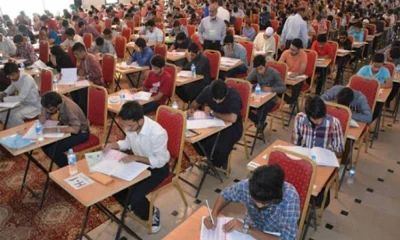Regional
Israel’s horrible year started long before October 7
One year into Netanyahu’s latest tenure, Israel’s state and society are truly weakened.

A year ago today, Benjamin Netanyahu’s sixth government was inaugurated with a clear majority, ushering in what Israelis hoped would be a new period of stability after more than three years of political turmoil. Reality quickly proved otherwise.
Instead, 2023 has been Israel’s annus horribilis, marked by a series of events that shook the nation to its core.
In early January, less than a month after the government was formed, Minister of Justice Yariv Levin unveiled a plan to radically reshape the foundations of Israeli democracy and concentrate power in the hands of the executive. Israelis, many of whom perceived the move as a step toward authoritarianism, took to the streets to halt the judicial overhaul, staging some of the largest mass demonstrations Israel has ever seen week after week. In July, as the Knesset (Israel’s Parliament) passed the first legislation of the overhaul, concerns over social disintegration intensified.
Then came the deadliest day in the country’s history. On October 7, Hamas terrorists infiltrated Israeli territory and killed over 1,200 people, including many civilians. In the immediate aftermath of the massacre, the Israeli state proved incapable of an immediate effective response; it was left to voluntary organizations to evacuate Israelis living next to the Gaza border. The war in Gaza that ensued is still raging, with over 20,000 Palestinians killed and over 85 percent of the population displaced, over 160 Israeli soldiers killed, and no clear path for the Israeli government to deliver on its stated goals. An annus horribilis indeed.
How has it come to this — so much damage in so little time?
As a first attempt at this — focusing on the internal dynamics of Israeli politics and without assuming an exhaustive answer — three factors are worth highlighting: populism, polarization, and the personalization of politics. The interplay of these three factors proved so dangerous since it simultaneously weakened both Israeli society and Israel’s state capacity.
High levels of populism among members of the government fueled the judicial overhaul, which intensified internal strife — emboldening Israel’s adversaries. Then, after the October 7 attack, the government’s inadequate response exposed Israel’s weakened state, a result of populist assaults on public servants in a polarized climate as well as years of political personalization in which loyalty took precedence over professional qualifications in public service appointments.
This was a uniquely bad year for Israel, worth understanding in its own right. But Israel is far from the only democratic country confronting some combination of populism, polarization, and personalization — and democracies would do well to heed this tragic tale.
Netanyahu’s coalition entered power with a decidedly populist bent
Benjamin Netanyahu returned to the office of the prime minister, a position he had previously held from 1996–1999 and 2009–2021, and within a week, it was clear that populism would be a defining feature of his tenure.
On January 4, Levin announced a plan for a judicial overhaul that aimed to dramatically reorganize the basic architecture of Israeli democracy. According to Levin, the court “has eroded trust to a dangerous low and has not brought proper governance. People we didn’t choose — decide for us. This is not democracy.” The judicial overhaul was therefore designed to reshape Israel’s delicate system of checks and balances, lifting constraints over the elected branches.
The overhaul consisted of multiple measures, including granting the government greater influence in the selection of judges and restricting the court’s ability to strike down legislation. Critics warned that these measures were designed to collectively form what legal scholar Kim Lane Scheppele termed a “Frankenstate”: a disfigured democracy crafted by a mishmash of legal arrangements adopted from other countries and patched together to ensure maximum power in the hands of the government. Soon, one of the largest mass protest movements in the history of the country emerged, with hundreds of thousands of Israelis taking to the streets.
This attack on the functioning of Israel’s state was not some aberration in Netanyahu’s government. While much of the public attention following the formation of the government went to its most radical elements — such as Itamar Ben-Gvir, previously convicted of incitement to racism and supporting a terrorist organization and now appointed as minister of national security — the judicial overhaul was central to the goals of all parts of the new coalition. It was presented not by a minister from a small fringe party, but by Levin, a minister from Netanyahu’s party, the mainstream Israeli right-wing Likud. This, however, should come as no surprise given evidence that the Likud stands out among mainstream right parties for its extreme level of populism.
For populists, politics is a never-ending struggle between the pure, unified people and the corrupt, malicious elites. Populist leaders claim that they, and only they, are the true representatives of the authentic people. Consequently, they perceive constraints on the executive branch — whether in the form of judicial review or public servants who are committed to ethical, professional service — as hurdles to be dismantled.
Clear examples of this populist script can be found in the rhetoric of elected representatives from the Likud party, commonly framing state institutions — from the military to the Bank of Israel — as an all-encompassing “deep state” at the service of corrupt elites. Former Minister of Information Galit Distel-Atbaryan tweeted that her party “will continue to free Israel from the oppression of the elites.” The minister of transportation, Miri Regev, railed against “an elite that seeks to override the will of the people.” Tali Gottlieb, a member of Parliament, stated that “the deep state has infiltrated the leadership of the Shin Bet and the IDF.”
New data confirms that extreme populism is a key feature of Israeli politics. The Chapel Hill Expert Survey measures the salience of anti-elite and anti-establishment discourse in the public communication of political parties around the world. While imperfect, this is a useful proxy to measure populism comparatively. Israel was just added to this data set, which allows us to locate Israeli parties next to their counterparts abroad. Such comparative analyses show that Likud is populist to the bone. Its levels of populism align more closely with the European populist radical right than with mainstream right parties. For instance, when compared to Germany, the Likud’s level of populism is more similar to the radical right Alternative for Germany than to the center-right Christian Democrats.
In fact, the Likud’s populism is in a similar league with that of the right-wing parties pushing for democratic backsliding in Eastern Europe: Fidesz in Hungary and PiS (Law and Justice) in Poland. In both countries, democratically elected governments sought to use legal means to hollow out democratic governance. This is the populist textbook of democratic erosion that Likud was following with its judicial overhaul: pushing a plan that, according to then-Chief Justice Hayut, would deal a “fatal blow” to Israeli democracy.
Partisan animosity in Israel is reaching a dangerous peak
Populism often fuels a vicious circle of polarization, as explained by political scientists Jennifer McCoy and Murat Somer: “Populist leaders rail against the establishment or the elites, blaming them for the plight of the people […] When opponents reciprocate with derogatory antipopulist language, the polarizing dynamic spirals.” Importantly, this polarization manifests not in policy disagreements but rather in animosity and hostility across party lines. As would be expected, the growing salience of populist discourse in Israeli politics went hand in hand with growing inter-partisan animosity.
Analyses of survey data collected in Israel reveal that by late 2022, partisan animosity had reached record levels. The Israel National Election Surveys allows us to track changes over time in affective polarization, defined as the difference between how much voters like their own party and how much they dislike political opponents. Out-party dislike has increased since Netanyahu took office in 2009, following a decline during most of the previous decade. When Netanyahu reentered the office of prime minister in 2022, affective polarization had reached its highest level since data began to be collected in the early 1990s.
While comparable data has not yet been collected since the 2022 elections, clashes over the judicial overhaul likely deepened partisan divisions. Specifically, concerns over the spillover effects of polarization and the disintegration of military units were voiced throughout the year, with some 10,000 military reservists threatening to stop volunteering for service if the government persists with the judicial overhaul.
These were real blows to Israeli society and its sense of cohesion, which was interpreted by its enemies as an opportunity to strike.
As reported in Haaretz, a senior intelligence officer warned Netanyahu that clashes over the judicial overhaul are “worsening the damage to Israeli deterrence and increasing the probability of escalation.” Minister of Defense Yoav Gallant warned in March that the internal strife is eroding Israel’s national security. In response, Netanyahu sought to fire Gallant but rescinded the dismissal in the face of mass public outrage. In July, in a Knesset Foreign Affairs and Defense Committee meeting regarding the implications of the judicial overhaul, Gallant warned that “there is harm to national resilience that may lead to harm to national security” and added that Israel’s enemies “believe, mistakenly, that they have the opportunity to take advantage of what they perceive as a weakness.” Yet the government moved forward with the judicial overhaul. And then came October 7.
A weakened state is facing a crisis
It has been almost three months since Hamas’s heinous attack that led to a full-scale war with catastrophic devastation in Gaza, and the magnitude of this catastrophe is beyond imagination. What was clear just days after the attack, however, is that Israeli civil society demonstrated outstanding solidarity. Organizations such as Brothers and Sisters in Arms, which emerged earlier this year to oppose the judicial overhaul, quickly reoriented their efforts to help survivors. They evacuated people trapped in fighting zones and provided them with food and basic amenities; shipped toys for families with kids living close to the border; and more. Such civic awakening in times of crisis is admirable, but it raises the question: Where was the state?
In short, it did not have the capacity to rise to the moment.
For populists who see themselves as the exclusive representative of the “real” people, civil servants with professional ethics and willingness to question politicians’ decisions can quickly be labeled as a “deep state” that must be dismantled. And in intensely polarized environments, civil servants raising tough questions may easily be accused of serving political opponents. The negative implications of these two factors on state capacity were further compounded by an additional feature of contemporary Israeli politics: personalization of the political system, defined as a “process in which the political weight of the individual actor in the political process increases over time, while the centrality of the political group (i.e., political party) declines.”
As political systems become increasingly personalized, individual leaders amass growing centrality and authority at the expense of collective institutions. In such a system, loyalty to the leader plays an increasingly important role in appointments to positions of power, overshadowing considerations of professional credentials and proven capacities.
This is what has happened to Israel over the last four decades.
Once again, comparative research is helpful: Researchers who compared levels of personalization in 26 established democracies in 2018 located Israel at the top of the list, together with Italy. This comparison is based on multiple indicators, such as decision-making procedures within parties and the ways media coverage centers on leaders rather than parties. The centrality of Benjamin Netanyahu in shaping Israeli politics is hard to overstate. Analyses of survey data reveal that sentiments toward Netanyahu have become the primary organizing principle in Israeli politics.
The implications of this extreme personalization for public service were dire as expected. Less than a month before the Hamas attack, public administration scholars Sharon Gilad and Ilana Shpaizman warned of the consequences of this weakening of the public service. Based on interviews and a focus group with hundreds of civil servants, they documented increased pressure from political appointees and politicians, and skilled civil servants’ intent to leave the public sector. As Haaretz reported, managers say they are facing difficulties recruiting and retaining qualified employees. Gilad and Shpaizman presciently concluded that the erosion of state capacity presents a significant threat to all Israelis. The magnitude of this threat became painfully evident when Israeli ministries were glaringly incapable of responding to the deadly October 7 attack.
What now?
For Israel, 2023 was a year in which decades happened. As the year draws to an end, Israelis are grappling with the repercussions of its unique noxious blend of populism, polarization, and personalization.
While Israel faces specific security threats, there is a lesson here that extends beyond national borders. A resilient political system is one that fosters competition across the ideological spectrum while steadfastly resisting the allure of those who undermine state capacity in the pursuit of loyalty and in their fight against imagined elites and fifth columns. The threats and vulnerabilities posed by populism, polarization, and personalization crystallize in times of crisis, when an urgent and robust response is needed but the state proves too weak to react effectively.
Democracies worldwide would be wise to heed this tragic cautionary tale.
-

 Technology 1 day ago
Technology 1 day agoCrypto giant Bitcoin touches record high of $100,000
-

 Pakistan 1 day ago
Pakistan 1 day agoBushra Bibi's allegations against Saudi Arabia are shameful: Khawaja Asif
-

 Pakistan 17 hours ago
Pakistan 17 hours agoGovt to suspend internet services amid PTI protest
-

 Pakistan 1 day ago
Pakistan 1 day agoNobody to be allowed to stage sit-in or gathering in capital: Naqvi
-

 Business 1 day ago
Business 1 day agoGold prices rise sharply in Pakistan
-

 Pakistan 1 day ago
Pakistan 1 day agoCOAS Asim Munir vows to dismantle hostile terrorist networks
-

 Crime 2 days ago
Crime 2 days ago39 killed in Parachina-Peshawar vehicles firing
-

 Regional 21 hours ago
Regional 21 hours agoCM Maryam visits Nishtar Hospital, suspends paramedics over AIDS spread





























